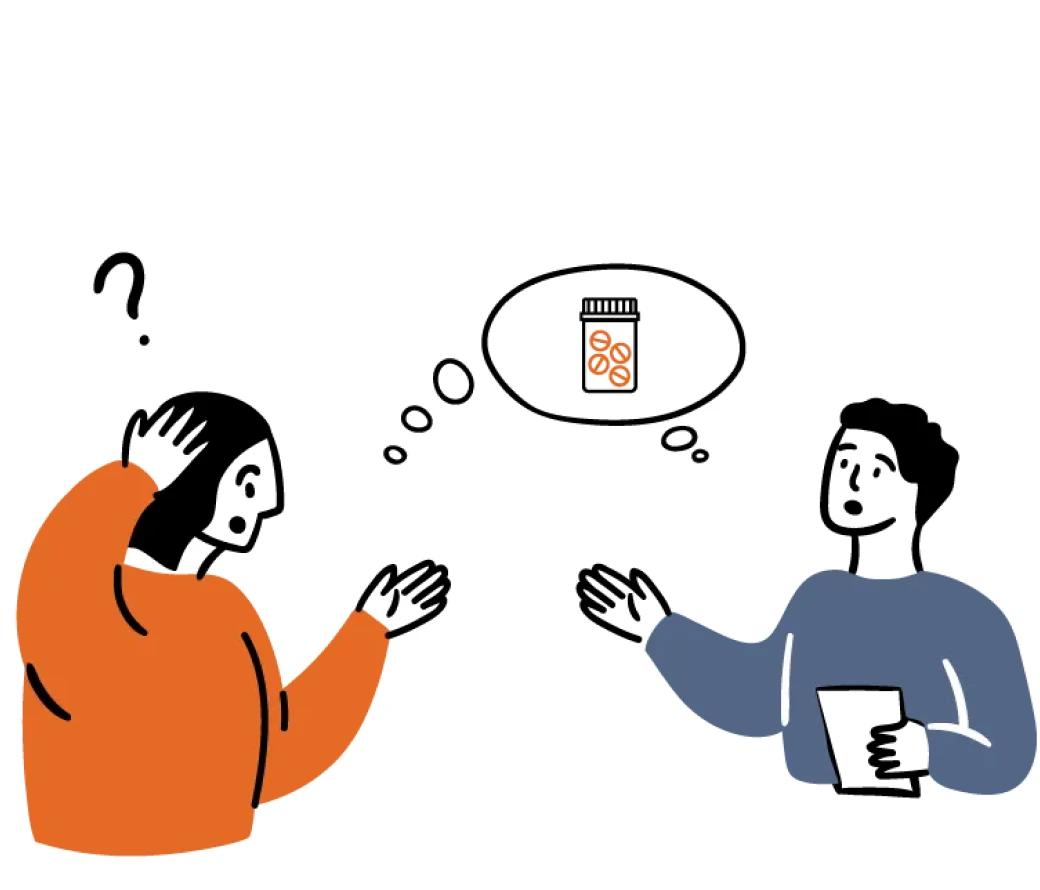A lot of scary headlines out there might be telling you about the opioid epidemic and the death toll it’s taking. There’s another headline they could be writing, though, one about hope.
Across the world, the use of medication-assisted treatment (MAT) for substance use disorder has proven to be an effective choice for people recovering from opioid use disorder (OUD). Among the medications used for MAT, Suboxone (buprenorphine/naloxone) is one of the most commonly prescribed and is shown to reduce opioid-related overdose deaths.
Unfortunately, despite the effectiveness of Suboxone, there are still plenty of myths and incorrect beliefs surrounding the medication. For anyone who has ever had or heard a conversation about MAT, they’ve heard the tales.
“Taking Suboxone isn’t really recovery!”
“They’re just trading one addiction for another!”
“It’s a way to get high when they’ve run out of heroin!”
These statements are not only false but also incredibly shaming, and they may lead someone with a substance use disorder to not begin lifesaving treatment.
At Better Life Partners, we know Suboxone can be an effective tool in recovery, and we think it’s time to break down the myths about it and tell you the real story.
Myth #1: You aren’t in recovery if you’re on Suboxone.
This is a myth that comes down to someone’s outlook on what recovery actually is. We believe that recovery is determined by how the individual defines it, not what others think or try to label it as.

The reality is that for some people, treatment that avoids any type of substance is not a realistic option. When going through withdrawals from opioid use, the body is put into a state of shock that does not only cause suffering but can also lead to relapse.
By taking Suboxone or another prescribed MAT medication, a person can regulate their brain’s chemistry, reduce withdrawal symptoms, reduce cravings and thus reduce the risk of relapse and overdose. By reducing withdrawal symptoms, people may find they are better able to engage in all aspects of the recovery process, from counseling to working toward goals.
Myth #2: People misuse Suboxone.
Suboxone is far less likely to be misused than someone taking non-prescribed drugs like heroin or painkillers like Vicodin or OxyContin.
This myth likely comes from people not knowing what Suboxone is. But, we’ll break it down for you. Suboxone is a combination of the medications buprenorphine and naloxone.
Buprenorphine is a partial opioid agonist, which means it acts on the brain in similar ways as other opioids. It works slowly and doesn’t give people the rush and high of other opioids. It gives a person a feeling of peace and stability, and helps recovery by preventing withdrawals, cravings, and a sense of sadness people feel after stopping opioids. Buprenorphine has a ceiling effect, meaning that using more Suboxone will not lead to an overdose.
Naloxone is an opioid antagonist. This means it blocks the effects of opioids. The most well known form of naloxone is Narcan. If Suboxone is taken as prescribed, people do not absorb the naloxone and it is therefore not active. If Suboxone is misused and injected, it blocks the effect of the buprenorphine.
Myth #3: Suboxone should only be taken for a short period of time.
This myth also comes down to a matter of opinion among the experts. Theories exist that Suboxone is a short-term solution, but there is evidence that stopping Suboxone early can lead to relapse and overdose.
For those who believe Suboxone is only for short-term help, there is no evidence to support that claim.
Suboxone helps manage withdrawal symptoms as your body and mind regain stability from the opioids that were once in control. But what happens when you stop taking Suboxone? The cravings and symptoms of withdrawal from opioids don’t just disappear.
For that reason, long-term use of Suboxone is recommended as it gives the best chance of long-term recovery. How long that is depends on many factors which is why it’s important that each person has these conversations with their care team.

Myth #4: Suboxone isn’t a treatment for addiction if you aren’t getting therapy along with it.
While this isn’t true, it’s probably better to receive therapy along with Suboxone treatment.
Suboxone alone helps in extraordinary ways, but combining Suboxone with group counseling sessions can help rebuild community among people who have been in your shoes.
Therapy types included are one-on-one counseling and group therapy.
Myth #5: It’s just as easy to overdose on Suboxone as it is to overdose with other substances.
This one is completely false. Suboxone has a ceiling effect, meaning that its effect is limited above a certain dose.
Assuming the person taking Suboxone has an opioid tolerance from misuse of other opioids, it’s incredibly difficult to overdose on Suboxone compared with other opioids because of the built-in ceiling effect.
Because of this effect, people who have a tolerance to opioids before taking the medication are unable to reach the point of overdose. If someone has a low or no tolerance to opioids, they could potentially overdose.
A person can also overdose on Suboxone if they’re mixing it with other substances, notably benzodiazepines like Xanax or Klonopin, or alcohol. The mixture causes excessively slowed breathing, so it’s essential to avoid other substances while taking Suboxone.

Myth #6: Suboxone is a gateway to other addictions.
Suboxone is prescribed as part of treatment for opioid use disorder and is usually combined with behavioral therapy. People rarely get high from Suboxone and usually find that it helps them calm their minds. Suboxone-assisted recovery helps people rebuild their lives and leave the chaotic drug use that defines addiction behind.
In fact, Suboxone is often the opposite of a gateway to other addictions. A person who has been prescribed Suboxone is not someone who has yet to encounter drugs, they are already struggling with addiction. Suboxone is a sign that recovery has begun.
Myth #7: If I take Suboxone, no one will believe I’m in recovery.
At one point, there was incredible stigma surrounding Suboxone and this myth was considered true, but with time and research, many have come to accept and support Suboxone treatment efforts.
Unfortunately, negative and often unfair beliefs are still out there. While we have made major progress toward better understanding and acceptance, there is still a long way to go.
Choosing to get treatment with Suboxone comes with the risk that not everyone is going to understand, but mostly you will have roaring support from people around you.
There are people to help you through recovery by standing at your side and creating a supportive environment.

Myth #8: Quitting Suboxone is as hard as quitting heroin.
Withdrawals affect everyone differently, but to say quitting Suboxone is as hard as quitting heroin is not true.
If you decide to taper off Suboxone safely after a long period of time taking it, you could face withdrawal symptoms. But, because of the chemical makeup of Suboxone and the fact that you’ll likely be doing it with a doctor’s supervision, there are ways to avoid withdrawal, especially if you taper off slowly.
Myth #9: Patients will just sell Suboxone.
This is another myth built on the fact that there is still a lot of ignorance about MAT. Most people find Suboxone so helpful in their recovery that they do not want to sell it.
When a patient is prescribed Suboxone, they are monitored closely to prevent them from selling the medication.
Myth #10: The Granddaddy of All Suboxone Myths: “You’re just trading one addiction for another.”

This is false. And unfortunately, it’s not going to stop being spread as a myth until we can help more people learn about the positive effects of MAT with Suboxone.
Plain and simple, Suboxone is a safe, monitored, and controlled method for treating opioid use disorder. It’s been proven safe and effective.
The hope is that by creating lists like this one, we can break down the misunderstanding surrounding MAT.
Better Life Partners is here to walk with you on your recovery journey.
We work with communities throughout Maine, Massachusetts, New Hampshire, North Carolina, and Vermont to bring medications like Suboxone to those ready for recovery.

The decision to seek recovery is rarely easy. But, we’ll stick with you and support you with the right tools to reach long-term recovery.
We believe in providing treatment on your schedule. Based on your rules. From virtual groups to make-up meetings, we understand that you have a life outside of treatment. We’re here to support you in recovery. Whatever that looks like to you.
If you or a loved one is in need of treatment, fill out this form or call us today at (866) 679-0831.
If you want to support the work we’re doing, we’d be happy to work with you. To learn more about becoming a partner, complete this form.






